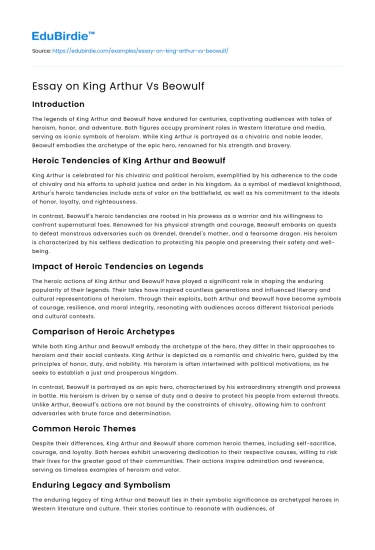Introduction
The legends of King Arthur and Beowulf have endured for centuries, captivating audiences with tales of heroism, honor, and adventure. Both figures occupy prominent roles in Western literature and media, serving as iconic symbols of heroism. While King Arthur is portrayed as a chivalric and noble leader, Beowulf embodies the archetype of the epic hero, renowned for his strength and bravery.
Heroic Tendencies of King Arthur and Beowulf
King Arthur is celebrated for his chivalric and political heroism, exemplified by his adherence to the code of chivalry and his efforts to uphold justice and order in his kingdom. As a symbol of medieval knighthood, Arthur's heroic tendencies include acts of valor on the battlefield, as well as his commitment to the ideals of honor, loyalty, and righteousness.
Save your time!
We can take care of your essay
- Proper editing and formatting
- Free revision, title page, and bibliography
- Flexible prices and money-back guarantee
In contrast, Beowulf's heroic tendencies are rooted in his prowess as a warrior and his willingness to confront supernatural foes. Renowned for his physical strength and courage, Beowulf embarks on quests to defeat monstrous adversaries such as Grendel, Grendel's mother, and a fearsome dragon. His heroism is characterized by his selfless dedication to protecting his people and preserving their safety and well-being.
Impact of Heroic Tendencies on Legends
The heroic actions of King Arthur and Beowulf have played a significant role in shaping the enduring popularity of their legends. Their tales have inspired countless generations and influenced literary and cultural representations of heroism. Through their exploits, both Arthur and Beowulf have become symbols of courage, resilience, and moral integrity, resonating with audiences across different historical periods and cultural contexts.
Comparison of Heroic Archetypes
While both King Arthur and Beowulf embody the archetype of the hero, they differ in their approaches to heroism and their social contexts. King Arthur is depicted as a romantic and chivalric hero, guided by the principles of honor, duty, and nobility. His heroism is often intertwined with political motivations, as he seeks to establish a just and prosperous kingdom.
In contrast, Beowulf is portrayed as an epic hero, characterized by his extraordinary strength and prowess in battle. His heroism is driven by a sense of duty and a desire to protect his people from external threats. Unlike Arthur, Beowulf's actions are not bound by the constraints of chivalry, allowing him to confront adversaries with brute force and determination.
Common Heroic Themes
Despite their differences, King Arthur and Beowulf share common heroic themes, including self-sacrifice, courage, and loyalty. Both heroes exhibit unwavering dedication to their respective causes, willing to risk their lives for the greater good of their communities. Their actions inspire admiration and reverence, serving as timeless examples of heroism and valor.
Enduring Legacy and Symbolism
The enduring legacy of King Arthur and Beowulf lies in their symbolic significance as archetypal heroes in Western literature and culture. Their stories continue to resonate with audiences, offering insights into the human condition and the eternal struggle between good and evil. Through their heroic personas, Arthur and Beowulf have become symbols of honor, duty, and righteousness, embodying timeless ideals that transcend the boundaries of time and space.
Conclusion
In conclusion, the comparison between King Arthur and Beowulf highlights the diverse manifestations of heroism in Western literature. While Arthur represents the ideals of chivalry and nobility, Beowulf embodies the qualities of strength and bravery. Despite their differences, both figures exemplify the timeless appeal of heroism and continue to inspire audiences with their tales of valor and adventure.






 Stuck on your essay?
Stuck on your essay?

